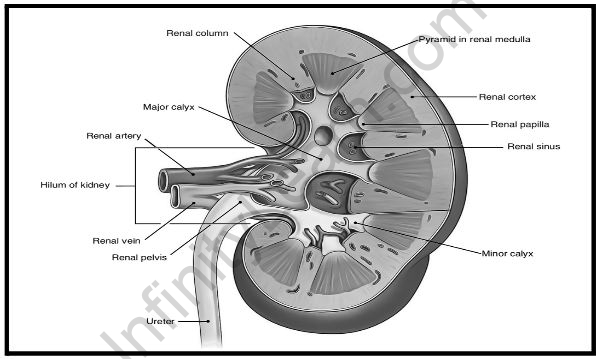Table of Contents
Uremia is a clinical condition characterised by high levels of urea in the blood. Urea is an important component of urine. The term uremia referred to urine in the blood and was first used by Pierre Adolphe Piorry to describe the clinical condition associated with kidney failure.
Uremia is a pathological condition that occurs when our kidneys are damaged. Toxins and waste products such as urea and creatinine end up in the bloodstream, posing a serious risk to the body. In addition, high levels of urea in the blood also lead to hormonal imbalances, electrolytes, fluids, and other metabolic disorders.

In later stages, Uremia is a chronic kidney disease but may occur with severe kidney failure or kidney damage. None of the uremic toxins has been identified yet to cause clinical manifestations of uremia. Various toxins such as beta-2-microglobulin, parathyroid hormone, and enhanced glycosylation, as well as other molecules that contribute to the clinical syndrome.
Symptoms of Uremia
Initially, chronic kidney disease may be completely symptomatic. However, by the time the body begins to show signs of uremia, the kidneys are already severely damaged. Uremia can cause a person to show more severe symptoms. These are –
- Nausea or vomiting.
- A headache.
- Loss of food.
- Excessive fatigue.
- Cramps in various parts of the body.
- Inability to concentrate.
What is Kidney or Kidney Failure?
The kidneys help the body excrete waste products that are the product of metabolism. Urea is a very important product of metabolism. Our kidneys help filter the waste products into the bloodstream and transfer them to the bladder and urinary tract for excretion.
As a result, when the kidneys fail to do so, waste products accumulate in the bloodstream leading to azotemia.
Often, when the kidneys are damaged enough to cause symptoms, azotemia eventually leads to uremia. This can cause a series of hypoglycemic effects that can cause diabetes, and if proper treatment and medication are given, the body can be severely damaged.
Problems with Uremia
Serious and irreversible damage to the kidneys, such as chronic kidney disease, often causes rheumatism. As a result, the kidneys do not function properly and can no longer filter waste products into the body’s metabolism and excrete them in the urine. Garbage quickly accumulates in the bloodstream, leading to a life-threatening condition.
There are many factors that cause chronic kidney disease and subsequent uremia. For example, a person with high blood pressure may have kidney and kidney problems. Other causes are:
- Recurrent kidney infection.
- Kidney stones cause prolonged obstruction of the urinary tract.
- Cancer.
- Enlarged prostate gland.
- Inflammation of the kidney tubules and surrounding systems.
- Inflammation of the glomeruli, kidney filtration units.
- Type 1 and Type 2 diabetes.
- Polycystic kidney disease.
Treatment of Uremia
By the time a person develops symptoms of uremia, the kidneys are already severely damaged. The main treatment for uremia is dialysis. Dialysis removes impurities, toxins such as creatinine, and excess fluid from the blood, which is otherwise digested by the kidneys. Basically, there are two types of dialysis. These are –
Peritoneal Dialysis:
In peritoneal dialysis, a small tube called a catheter is inserted into each person’s uremic abdomen. Fluid builds up in the stomach. It absorbs all the extra waste and unwanted fluids. Eventually, the residue is removed from the body, and it is removed.
Haemodialysis:
In this application, a machine is used to remove waste from the bloodstream.
A person may also have a kidney transplant if the kidneys are too damaged to be cleaned. This is called end-stage renal failure. In kidney transplantation, healthy kidneys are obtained from a willing donor and transferred to a patient’s body.
Rehabilitation medicine, currently the subject of numerous studies, is also an effective way to deal with damaged kidneys. This process uses cells in other parts of the body to help treat kidneys.
In conclusion, kidney failure caused by uremia can be prevented in a number of ways. For example, taking practical steps to control diabetes and ensure good cardiovascular health is a good way to prevent kidney failure. Eating a healthy diet, exercising regularly, and maintaining healthy blood pressure are also ways to prevent uremia and kidney failure.
Also read: Important Topic of Biology: Renal Failure
Frequently Asked Questions:
What Is the Meaning of Uremia?
Uremia is a clinical condition that occurs when our kidneys are damaged. Toxins and waste products such as urea and creatinine end up in the bloodstream, posing a serious risk to the body.
Q. What Are Some Symptoms of Uremia?
Ans: A few symptoms of uremia are:
- Nausea or vomiting.
- A headache.
- Loss of food.
Q. What Are the Main Causes of Uremia?
Ans: Other causes of uremia include:
- Recurrent kidney infection.
- Kidney stones cause prolonged obstruction of the urinary tract.
- Cancer.
- Enlarged prostate gland.
- Inflammation of the kidney tubules and surrounding systems.
- Inflammation of the glomeruli, kidney filtration units.









